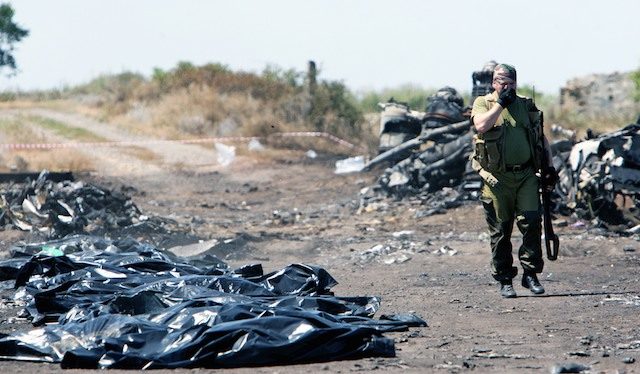SUMMARY
This is AI generated summarization, which may have errors. For context, always refer to the full article.

GRABOVE, Ukraine – The first relatives of victims on the ill-fated Malaysia Airlines flight MH17 arrived on Saturday, July 26, at the crash site, as Dutch and Australian forces prepared for possible deployment to secure the location in rebel-held east Ukraine.
A truce has been called in the immediate area surrounding the site by both the Kiev forces and pro-Russian separatists, but fierce combat was raging just 60 kilometers (35 miles) away, with loud explosions heard at regular intervals in two suburbs of rebel stronghold Donetsk.
Ignoring safety warnings, an Australian couple travelled to the scene of the crash without any escort, saying they were fulfilling a promise to their only child that they would be there.
“She was full of life,” said Angela Rudhart-Dyczynski about their 25-year-old daughter Fatima who died when the Amsterdam to Kuala Lumpur plane was shot down 9 days ago, killing all 298 on board.
She and her husband Jerzy Dyczynski broke down in tears as they walked among the wreckage and scorched earth, and laid a large bouquet of flowers on part of the debris.
A complex investigation into the downing of flight MH17 has been hampered by the violence plaguing east Ukraine, which claimed at least nine lives in the last 24 hours in insurgent holdout Lugansk.
Dutch forensic experts sought to travel to the site on Saturday but turned back over safety concerns. They were due to try again later.
The deadly insurgency is also raising questions over the viability of the Dutch-led international mission to secure the site where the airliner crashed.
The rebels who are accused of shooting down the plane with a missile from Russia have signalled that they are only open to allowing a small group in.
But Australian Prime Minister Tony Abbott, whose country lost 28 citizens in the crash, stressed that it is a “humanitarian mission.”
“Plainly there are unrecovered body remains in the area. And it’s the presence of unrecovered remains that makes it more important than ever that an international team be dispatched to the site,” he said.
“Others can get involved if they wish in the politics of eastern Europe, our sole concern is to claim our dead and to bring them home.”
Passenger belongings reappear
Dutch authorities leading the probe said a total of 227 coffins have been flown to the Netherlands.
But many more victims’ remains lie in the sweltering heat on the vast crash site alongside the burnt-out wreckage of the plane.
After a few days when little activity was seen, recovery efforts appeared to have restarted again on Saturday, Agence France-Presse (AFP) reporters at the scene said.
In a sign that the site is still not secured, OSCE monitors who have been at the scene daily say they had also noticed personal objects of passengers including credit cards and passports that were not there before suddenly reappearing.
It remains unclear if the international security forces will gain access, as OSCE monitors said rebels controlling the area were only ready to accept between 25 to 35 members of foreign delegations.
Ukraine’s parliament, which needs to formally approve any international deployment, is only due to broach the issue at a special session on Thursday.
The Netherlands, which lost 193 of its citizens, said troops had been consigned to barracks and had leave cancelled ahead of the planned mission.
Australia is sending 190 police along with a small number of its defence forces to the Netherlands in view of the mission.
‘Second front’
In Brussels, the European Union punished Russia – which it accuses of abetting the insurgency by arming the rebels – with new sanctions on its intelligence chiefs.
Moscow angrily blasted the move as “irresponsible” and warned it put at risk cooperation on security issues.
As Ukraine’s army pressed on with its offensive to wrest back control of the vital industrial east, politicians in Kiev were battling to limit the fallout from Prime Minister Arseniy Yatsenyuk’s abrupt resignation on Thursday, July 24.
Lawmakers are to meet in a special session next week to discuss the prime minister’s future. President Petro Poroshenko has insisted on Yatsenyuk’s cooperation until new elections are held.
The premier quit in fury after several parties walked out of his ruling coalition in what appeared to be the beginning of a rancorous campaign ahead of parliamentary elections this fall.
The Fatherland faction of ex-prime minister Yulia Tymoshenko condemned the coalition’s collapse, saying it “opens up a second front” as the country battles to quell the eastern insurgency.
In a sign the upheaval in the cash-strapped country is ringing alarm bells beyond Ukraine, IMF chief Christine Lagarde rang Poroshenko to remind him of reforms Kiev had pledged to undertake in exchange for its $17-billion two-year financial lifeline.
The International Monetary Fund had previously forecast that Ukraine’s economy would contract by 6.5 percent this year.
The other chief protagonist in the Ukraine conflict – Russia – is also widely expected to sink into recession.
The 28-member EU is prepared from next week to impose sector-wide sanctions including embargoes on arms sales and access to financial markets, aimed at further hurting Russia. – Rappler.com
Add a comment
How does this make you feel?
There are no comments yet. Add your comment to start the conversation.